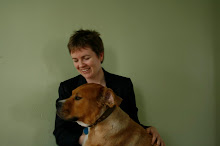WATERTOWN - By 5 o'clock, two hours before prom time, the clouds of hairspray had grown so thick inside Fisher Hall, they'd wafted into a courtyard. Inside the women's residence hall, Leslie Gruette was getting her hair styled and makeup applied before the biggest social event of the school year."Something pretty, but simple," requested Gruette, 20, who'll graduate later this month from the Perkins School for the Blind in Watertown. Bronze shimmer? Sure, she said. Lipgloss? Why not.
Thursday evening's prom was the fourth Gruette has attended during her eight years at Perkins, the oldest school in the United States for young people who are blind.
Someone at my kitchen table made a comment about the seeming irony of blind people caring about their appearance, but I started wondering: what are the aesthetics of blind people? If I were blind, would I pick a prom dress because its fabric felt special? Because it made a swishing sound when I walked? Or because my Mother told me it looked good on me? I am aware of a good deal of sociological research on the deaf sub-culture and its subwoofer-heavy aesthetics, but what of blind culture, if such a thing even exists?
It turns out that reviewing research on the aesthetics of blind people was no simple task. I put the search terms "blind people aesthetics" into Google Scholar and got no relevant hits on the first page, so I switched to the catalog of Harvard's library system, Hollis, and searched for "blind aesthetics," which mostly turned up books on metaphorical and literal blindness in literature. One thing that most of the items these searches turned up was that they were either not about actual blind people, or they were studies that viewed blind people as targets for intervention, not as subjects of aesthetic judgments. So far, I had found no research asking blind people, "So, what do you like?"
I went deeper into Hollis, looking for disabilities studies journals, but most of those dealt with developmental disabilities. However, I did find the Journal of Visual Impairment & Blindness, which (with the help of my handy Harvard ID number) led me to a much older article that I couldn't access electronically. This article apparently describes how the aesthetics of blind and sighted children differ in judging sculpture, so it would probably be right up my alley if I could find it, but I can't without diving into the library stacks and answering this question isn't quite worth it to me. However, the Journal of Visual Impairment & Blindness also led me to the American Foundation for the Blind (its parent organization) and to Psychological Abstracts (via PsycInfo), which indexes its articles.
Using PsycInfo, blind + aesthetic turned up 79 articles, most of which were irrelevant because "blind" in psychology often refers to an aspect of experimental design. I discovered some oddities such as a tellingly named Russian journal called Дефектологиа (Defectology). I also came across several studies of how visual art can be translated into tactile art in such a way that blind and sighted people can have aesthetically equivalent experiences, but these were oriented towards aesthetic education of visually impaired students, not to the, so to speak, native aesthetics of blind people.
So, what do you think I'm missing? Perhaps aesthetics was the wrong search term? Perhaps I should look not to research but to memoir? Sadly, in the end, I have no clearer idea of whether or not blind people share a common culturally- or cognitively-derived aesthetics, and I still don't know what a blind girl wants in a prom dress.
Research review summary
Results: unsatisfactory.
Difficulty: difficult.

Well to an archive-bound historian not trained in the subtleties of the social sciences the implication seems to be that the exercise of choosing the prom dress allows the person to transcend their blindness, to be 'normal'.
ReplyDeleteI have a blind friend; I can ask her if you like!
ReplyDeleteTry "beauty" or "sense of beauty" along with "blindness" - on a brief glance at some Google results from those there's a Washington Post article from 2006 titled The Beauty Myth and one from The Independent (UK) titled How a Blind Man Sees. I don't seem to be able to cut and paste links into this thing, or I would! It's an interesting question.
ReplyDeleteAlso, peripherally, and don't know much about them: the Art Beyond Sight program
The definition of aesthetic may be too broad to be distinctly differentiated by the loss of one sense. As you mentioned, the lack of a clear culture of the blind makes it difficult to study. Maybe there are studies of culture within blind schools that would give some insight. In a brief search I found an interesting article written by a blind woman, but it is not generalizable by any means.
ReplyDeleteBeauty and the Blind (1999)
http://www.unesco.org/courier/2001_07/uk/doss33.htm